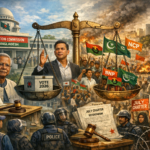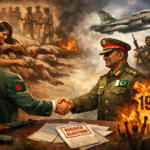Introduction
The shadow of 1971 looms large over Bangladesh, a period marred by a tragic bloodbath, widespread suffering, and loss. That year, the birth of Bangladesh came at a price no Bengali can forget, bought with the blood, sacrifice, and resilience of those who endured untold atrocities under Pakistan’s brutal regime. Today, as whispers of renewed ties between Bangladesh and Pakistan circulate, many Bengalis wonder if the scars of history are at risk of being wiped away by a dangerous romance of false friendship, packaged under slogans of Islamic unity and neighborly cooperation.
Historical Scars That Won’t Fade
The Liberation War of 1971 wasn’t just a political struggle but an existential fight for identity, culture, and freedom from oppression. In nine harrowing months, the Pakistani military unleashed unimaginable violence: civilians were slaughtered, entire villages razed, and millions displaced. Hundreds of thousands of Bengali women were sexually violated, left with scars both physical and psychological. This wasn’t just a civil war; it was a genocide, a concerted effort to break the spirit of an emerging nation. Fast forward to 2024, and it seems there are forces at play seeking to wash away these grim memories.
Why is it that after five decades, Pakistan is reentering Bangladesh’s geopolitical sphere, with reciprocal visa policies, new treaties, and proliferating media narratives calling for “brotherhood” between the two nations? Are these seemingly benign gestures not a betrayal of the very blood spilled to escape the clutches of Pakistan?
The Allure of Islamic Brotherhood: A Cloak for Manipulation?
It’s no secret that Pakistan has historically leveraged Islam as a unifying tool to strengthen ties in South Asia, especially among Muslim-majority nations. Some analysts point to Pakistan’s frequent appeals to Islamic solidarity as a calculated ploy to erase the bitterness of the past, hoping to overwrite memories with modern-day pragmatism. However, this“brotherhood” feels hollow, considering that Pakistan has yet to formally apologize for the atrocities committed in 1971.
This question begs asking: why does Bangladesh continue to engage with a government that has consistently sidestepped accountability for war crimes? Is this the price of “Islamic unity”—the erasure of national trauma and disregard for the bloodstained pages of history?
Cross-Border Agreements: Open Door to Malicious Intent?
Recent agreements, such as visa-free travel for officials and a shipping treaty between Karachi and Chittagong, raise eyebrows for more than economic reasons. Bangladesh is no stranger to the dynamics of South Asian power plays, and a closer relationship with Pakistan opens the door for Pakistan’s Inter-Services Intelligence (ISI) and other agencies to influence local politics covertly.
While these agreements are cloaked as “economic cooperation,” history warns of Pakistan’s strategic interference. Could these policies be the backdoor channels for Pakistan’s deep state to regain influence in a country that once rejected it so emphatically?
Media and Propaganda: A New Weapon to Whitewash History
A surge of YouTube discussions, podcasts, and other media platforms now feature Pakistani and Bangladeshi “analysts” shedding what can only be described as crocodile tears. These sessions are increasingly casting Bangladesh’s liberation as a misguided chapter, suggesting that today’s youth should “move on.” This narrative is insidious, eroding collective memory by suggesting that Bangladesh’s grievances are trivial or obsolete.
For a nation whose independence came at such high human cost, these media narratives seem engineered to recast history, undermining the legitimacy of Bangladesh’s struggle and diluting the crimes committed by Pakistan in 1971. The question then is: who benefits from such “healing”?
Strategic Indoctrination Through Cultural Exchange: A Trojan Horse?
If Pakistani cultural and media presence in Bangladesh is permitted to grow unchecked, it won’t be long before narratives of “shared history” morph into a rewrite of Bangladesh’s birth. Pakistan’s influential circles are well-versed in cultural diplomacy, using sports, media, and cultural exchanges to manipulate public perception.
The risk here isn’t just historical revisionism; it’s an erosion of Bangladesh’s sovereignty. Should this trend continue, it’s conceivable that future generations might begin to view 1971 not as a glorious struggle for independence, but as a“regrettable incident” that marred an otherwise harmonious Muslim brotherhood—a tragic revision that would dishonorall those who fought and died for Bangladesh.
Will Bangladesh’s Government Resist, or Capitulate?
Given the apparent warming of ties between Dhaka and Islamabad, one must question whether Bangladesh’s leaders are simply turning a blind eye or actively complicit in this worrying rapprochement. Does this signify a shift in Bangladesh’s foreign policy alignment away from a secular, sovereign identity, toward one subservient to Pakistan’sIslamic agenda? The present political climate in Bangladesh may be fractured, but the growing friendliness toward Pakistan risks compromising the very principles the nation was built upon.
Concluding Thoughts: Trust or Betrayal?
As Bangladesh and Pakistan move toward what some herald as “reconciliation,” a choice confronts every Bengali: to either embrace a sanitized version of history that overlooks Pakistan’s atrocities or to resist the allure of false friendship and stay vigilant against historical erasure. In engaging with Pakistan, Bangladesh risks not only dishonoring the memory of 1971 but inviting into its borders the very forces it once fought to escape.
This isn’t just a matter of economic deals or visa policies. It’s about national integrity, collective memory, and the unyielding responsibility to honor those who sacrificed everything for Bangladesh’s freedom. Trust is earned, not given, and Pakistan has done precious little to earn it. The question remains: will Bangladesh open the door to a former oppressor in the name of progress, or stand firm, preserving the sanctity of its hard-won sovereignty?






